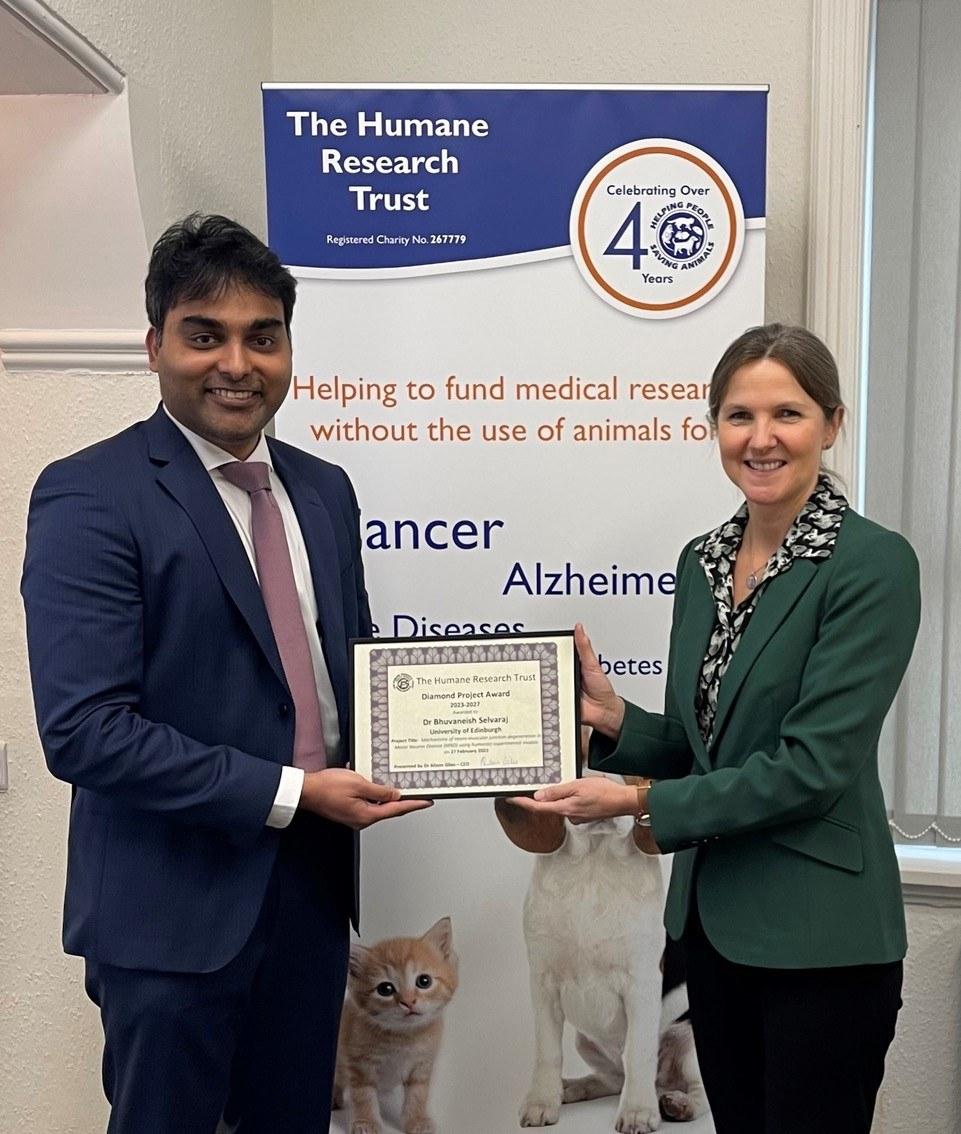In an exciting new project, Dr Bhuvaneish T Selvaraj, Emerging Leader at the UK DRI at Edinburgh, will investigate the mechanisms underlying motor neuron disease (MND) using cutting-edge human stem cell technology.
The project will develop the use of so-called ‘nerve-muscle assembloids’, which are three-dimensional structures comprising nerve cells and muscle cells, all of which have been grown in the laboratory from stem cells derived from a human blood or skin sample. The nerve cells and muscle cells grow together to form functioning structures called ‘neuromuscular junctions’, just as they do in the human body. Researchers believe that the degeneration of neuromuscular junctions is a key step in the development of MND.
As the brain is so complex and inaccessible, to be able to re-create neuromuscular junctions in a laboratory is a major step forward for human brain research. Using this new technology, the researchers will be able to compare assembloids generated from healthy people against those from people with MND, to search for differences in how their neuromuscular junctions look and function.
If differences are observed, the researchers will test drugs on the assembloids to try to correct any defects. Later, these drugs might become candidates for clinical trials in people with MND, testing their ability to slow down the progression of the condition.
The researchers will validate their findings in human post-mortem muscle samples generously donated to the Edinburgh Brain and Tissue Bank by people with MND.
This research is made possible by a Diamond Project Award which Dr Selvaraj and the cross-disciplinary project team received from The Humane Research Trust – an organisation whose mission is to advance the diagnosis and treatment of disease in humans by supporting new medical research which does not include the use of animals.
There is an urgent need for new treatments for MND. We are very grateful to The Humane Research Trust for supporting our project which will both enhance our understanding about MND and enable us to take one step closer to the identification of treatments.Dr Bhuvaneish T SelvarajEmerging Leader at the UK DRI at Edinburgh
The award was made by Dr Alison Giles, CEO of The Humane Research Trust, at a ceremony at the Trust’s offices in Bramhall, Greater Manchester, on 27th February 2023. The zoologist and TV presenter Megan McCubbin joined the event online and congratulated Dr Selvaraj for recognising the importance of using human models to understand the human brain. Not only was this good science, but it would improve human health without harm to animals.
The award also aligns with the UK DRI and the University of Edinburgh’s commitment to the principles of the ‘3Rs’ – replacing, reducing and refining the use of animals in research by using an alternative research method.

presents Dr Bhuvaneish T Selvaraj with the Diamond Project Award.
Dr Selvaraj was made an Emerging Leader at the UK DRI in 2021. He is also a Chancellor’s Fellow at the Anne Rowling Regenerative Neurology Clinic, University of Edinburgh and an Investigator of the Euan MacDonald Centre for Motor Neuron Disease Research.
On receiving the award, he said:
“There is an urgent need for new treatments for MND. We are very grateful to The Humane Research Trust for supporting our project which will both enhance our understanding about MND and enable us to take one step closer to the identification of treatments. Our work also highlights the utility of disruptive technologies such as human organoid models to study neurodegenerative diseases.”
Gill Homan, chair of The Humane Research Trust, said
“Our prestigious Diamond Project Award was launched to celebrate the Trust’s 60th year. In selecting the winning application, trustees were looking for cutting edge human-based research into an area of immense clinical need. Motor neuron disease is a devastating terminal illness and research into its causes and treatments has historically involved high animal usage. We were delighted to make this award to Bhuvaneish and contribute towards a greater understanding of this terrible disease using a human model to replace animal experimentation and suffering."
To find out more about Dr Bhuvaneish T Selvaraj's research, visit his UK DRI profile. To stay up to date on the latest research news and institute updates, sign up to receive our monthly newsletter, ‘Inside Eye on UK DRI’.
Source: The Euan MacDonald Centre for Motor Neuron Disease Research (University of Edinburgh)
Article published: 7 March 2023
Image credits: Shutterstock, Maxine Rawji: The Humane Research Trust
